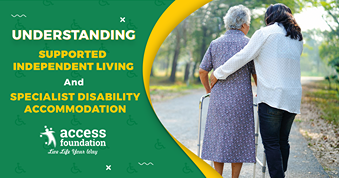
Understanding the difference between Supported Independent Living (SIL) and Specialist Disability Accommodation (SDA)
The National Disability Insurance Scheme (NDIS) is Australia’s very first national scheme aimed at helping people with disability. The scheme provides funding directly to individuals with disability who need it.
You must have come across the terms SIL and SDA if you have an NDIS plan or if you’re planning to apply.
Data shows that there are around 4.3 million people in Australia with a disability. The scheme aims to provide an estimated 500,000 Australians who have a significant and permanent disability with support and fundings within the next five years.
SIL and SDA are both different types of disability accommodation options. SIL stands for Supported Independent Living, and SDA stands for Specialist Disability Accommodation.
NDIS participants have control over the kind of supports and services they receive. And it’s essential to know the significant differences between these two options.
What is Supported Independent Living (SIL)?
Supported independent living (SIL) is one of the kinds of NDIS funding. These supports are provided to people with physical or mental disabilities who need them and want to live as independently as possible.
If a person with a disability cannot live independently or with their family, SIL can help them. SIL provides them with an opportunity to receive the support they need in a shared home.
SIL gives them an opportunity to enjoy independence, have an excellent social life, and access the support they need. People living in SIL receive daily support with tasks that include personal care, such as showering and dressing.
It also includes household tasks such as preparing meals, shopping, and cleaning. It also helps with medical needs such as administrating managing medication. SIL aims to help individuals develop their individual skills while encouraging them to live as independently as possible.
What is Specialist Disability Accommodation (SDA)?
Specialist Disability Accommodation (SDA) provides accommodation for individuals who require specialist housing solutions. SDA is for individuals that need extensive support due to extreme functional impairment.
SDA actually refers to the home or the apartment that the individual in need would live in. SDA funds are not targeted towards support services. The funds are for the accommodation in which the supports are delivered.
The beneficiaries can either live independently or share the place with others, depending on their personal needs. They can also choose the housing solutions that are appropriate for their individual needs and requirements.
So, What’s the Difference Between SDA and SIL?
SDA refers to a specifically designed accommodation or existing housing modified to meet the high needs of people who need extensive care.
And on the other hand, SIL refers to the supports and daily living services that are provided to a group of people in need while encouraging them to develop their personal skills and live as independently as possible.
A person can get SIL and SDA both if they’re eligible. If someone requires both daily living support for day-to-day tasks, as well as specially designed or modified housing, SDA and SIL will be funded separately in their NDIS plan.
Separate funding for SIL and SDA gives them the flexibility to reside in the housing suited to their needs and get the SIL supports of their choice.
Having the funding separated allows the person to change the support services without moving from their SDA-funded accommodation. It should be noted that they will be required to reapply for their SDA funding if they choose to move.
Conclusions
We hope you now understand the difference between SIL and SDA. If you are looking for a registered NDIS provider with the highest organizational and personal principles standards, then look no further.
Access Foundation is a registered NDIS service provider based in West Australia. We aim to offer high-quality support services and help the people with disabilities who require NDIS supports to fulfill their goals.
To learn more about our expertise and our NDIS services, please feel free to reach out to us.

